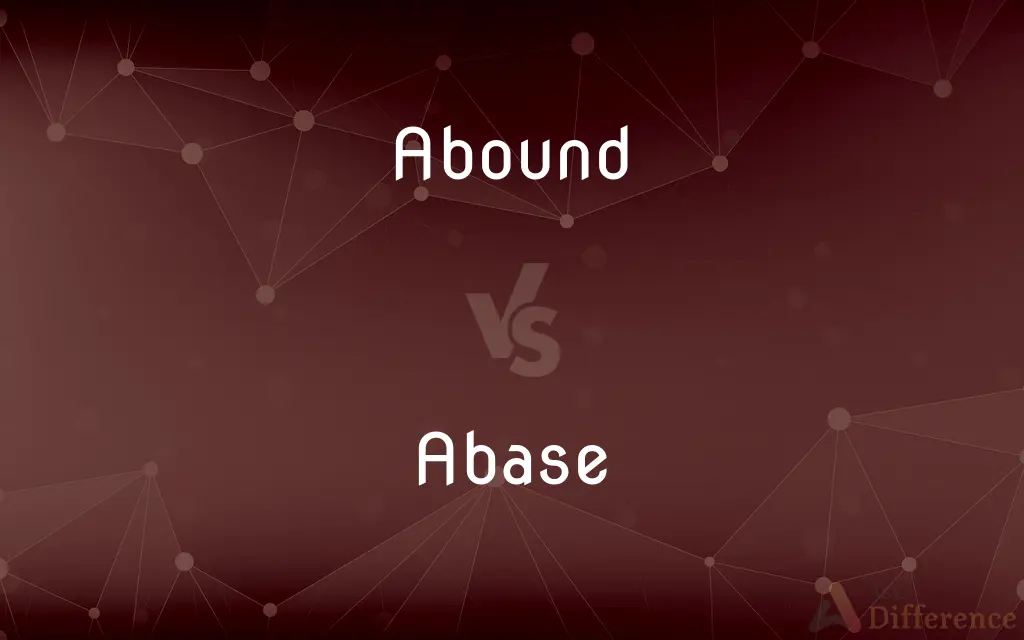Abound vs. Abase — What's the Difference?
By Tayyaba Rehman & Fiza Rafique — Updated on April 25, 2024
"Abound" refers to existing in large numbers or quantities, while "abase" means to lower in rank, reputation, or esteem.

Difference Between Abound and Abase
Table of Contents
ADVERTISEMENT
Key Differences
"Abound" is used to indicate a plentiful supply of something, suggesting abundance and often associated with positive contexts, such as resources or opportunities abounding. In contrast, "abase" involves reducing someone's status or dignity, typically in a negative or humiliating manner.
Opportunities may abound in a thriving economy, suggesting widespread availability and accessibility. On the other hand, an individual might abase themselves by acting in ways that undermine their respectability or standing, such as public misbehavior.
Wildlife may abound in a healthy ecosystem, reflecting biodiversity and ecological balance. Meanwhile, a leader might abase opponents through slander or disparagement to weaken their influence or authority.
In literature, metaphors often abound, enriching texts with vivid imagery and depth. Conversely, a character might abase another to demonstrate power dynamics or personal conflicts within the story.
Technologies abound in the modern world, signifying rapid growth and innovation across industries. Conversely, certain unethical practices in business or politics involve abasing rivals or subordinates to maintain control or dominance.
ADVERTISEMENT
Comparison Chart
Part of Speech
Verb
Verb
Meaning
To be plentiful, to exist in large numbers
To degrade, to lower in status
Usage in Sentence
Does not require an object
Requires an object
Connotation
Generally positive
Generally negative
Common Contexts
Nature, opportunities, resources
Social interactions, power dynamics
Compare with Definitions
Abound
To be present in large numbers or quantities.
Fish abound in the lake.
Abase
To humble or belittle.
He abased himself in front of the crowd to apologize.
Abound
To be prevalent or widespread.
Opportunities abound in the tech industry.
Abase
To lower physically or depress.
The regime sought to abase the rebels' morale.
Abound
To be rich or well-supplied with something.
The library abounds with old manuscripts.
Abase
To reduce in rank, office, prestige, or esteem.
He was abased after the scandal.
Abound
To be filled with; teeming.
The field abounds with flowers.
Abase
To lower in character, quality, or value.
Cheating abases the integrity of the game.
Abound
To exist in abundance.
Creativity abounds in the art class.
Abase
To degrade someone socially.
They attempted to abase their competitor through false accusations.
Abound
To be great in number or amount
"In areas where scorpions abound, spider populations are generally kept in check" (Natalie Angier).
Abase
To lower in rank, prestige, or esteem.
Abound
To have something in great numbers or amounts. Often used with in or with
"Neanderthal sites ... abound with artifacts, including scrapers, choppers, hand axes, and knives" (Philip and Carol Zaleski).
Abase
(transitive) To lower, as in condition in life, office, rank, etc., so as to cause pain or hurt feelings; to degrade, to depress, to humble, to humiliate.
Abound
(intransitive) To be full to overflowing.
Abase
To lower physically; to depress; to cast or throw down; to stoop.
To abase the eye
Abound
To be wealthy.
Abase
To lower in value, in particular by altering the content of alloys in coins; to debase.
Abound
(intransitive) To be highly productive.
Abase
To lower or depress; to throw or cast down; as, to abase the eye.
Saying so, he abased his lance.
Abound
(intransitive) To be present or available in large numbers or quantities; to be plentiful.
Wild animals abound wherever man does not stake his claim.
Abase
To cast down or reduce low or lower, as in rank, office, condition in life, or estimation of worthiness; to depress; to humble; to degrade.
Whosoever exalteth himself shall be abased.
Abound
(intransitive) To revel in.
Abase
Cause to feel shame; hurt the pride of;
He humiliated his colleague by criticising him in front of the boss
Abound
(intransitive) To be copiously supplied
The wilderness abounds in traps.
Abound
To be in great plenty; to be very prevalent; to be plentiful.
The wild boar which abounds in some parts of the continent of Europe.
Where sin abounded grace did much more abound.
Abound
To be copiously supplied; - followed by in or with.
Men abounding in natural courage.
A faithful man shall abound with blessings.
It abounds with cabinets of curiosities.
Abound
Be abundant or plentiful; exist in large quantities
Abound
Be in a state of movement or action;
The room abounded with screaming children
The garden bristled with toddlers
Common Curiosities
What does it mean for opportunities to abound?
It means that there are many opportunities available, often more than usual, suggesting a favorable situation.
What is an example of abasing someone?
A classic example of abasing someone is publicly humiliating them to damage their reputation or social standing.
Can abound be used negatively?
Typically, "abound" carries a positive connotation, but it can be used negatively if it refers to undesirable things being plentiful.
What causes a person to abase another?
Causes can include desire for control, jealousy, or psychological issues like inferiority complexes.
What are the consequences of abasing others?
Social and psychological consequences include loss of respect and authority, and possibly legal repercussions.
How does nature abound in certain areas?
Nature abounds when an area is rich in flora, fauna, and other natural resources, indicating a healthy environment.
How does technology abound in modern times?
Technology abounds due to rapid advancements and widespread adoption across various sectors.
Is "abase" commonly used in everyday language?
"Abase" is less common in casual conversation and is more often found in formal or literary contexts.
What are the ethical implications of abasing someone?
Ethical implications include the breach of respect and dignity, often leading to moral and social condemnation.
Can something negative like pollution abound?
Yes, negative aspects like pollution can also abound, particularly in poorly managed or industrial areas.
Can abounding be controlled or managed?
In contexts like wildlife or resources, management strategies are often necessary to maintain balance.
Share Your Discovery

Previous Comparison
Belch vs. Burp
Next Comparison
Normalcy vs. NormalityAuthor Spotlight
Written by
Tayyaba RehmanTayyaba Rehman is a distinguished writer, currently serving as a primary contributor to askdifference.com. As a researcher in semantics and etymology, Tayyaba's passion for the complexity of languages and their distinctions has found a perfect home on the platform. Tayyaba delves into the intricacies of language, distinguishing between commonly confused words and phrases, thereby providing clarity for readers worldwide.
Co-written by
Fiza RafiqueFiza Rafique is a skilled content writer at AskDifference.com, where she meticulously refines and enhances written pieces. Drawing from her vast editorial expertise, Fiza ensures clarity, accuracy, and precision in every article. Passionate about language, she continually seeks to elevate the quality of content for readers worldwide.
















































